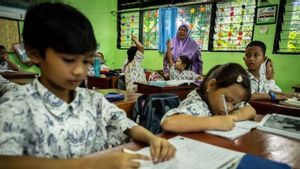JAKARTA Cases of violence in educational units are often in the spotlight in today's world of education in Indonesia. Could it be creating a safe and comfortable educational environment?
Every May 2, Indonesia celebrates National Education Day (Hardiknas). But after setting the National Education Day for the first time in 1959, the Indonesian world of education is still delegated with a myriad of homework, including cases of violence that are increasingly occurring.
In light of the endless violence, it seems that it is still a nightmare in the world of education in the country. Recently, there was a bullying involving an artist's child at the Binus School Serpong High School. But the bullying case was only one of a series of violent acts carried out in the education unit.
Cases of violence in educational units are not limited to bullying between students. It could be that what happens is that students beat teachers, teachers slap students, school principals abuse teachers, and not even a few parents even commit violence against teachers.
A number of cases of violence that had gone viral on social media in the last few months of junior high school students in Cilacap, Central Java, who beat, dragged, and stepped on other students. There was also another incident when an elementary school student said rudely and wanted to beat his teacher in Fifty Cities, West Sumatra. In Demak, Central Java, a madrasah Aliyah student beat the teacher because he was prohibited from taking the exam.
Not to mention the series of other cases of violence, both in educational units under the authority of the Ministry of Education, Culture, Research, and Technology and the Ministry of Religion. Even for educational units under the Ministry of Religion there are those that cause casualties.
Like AH (13), a student from one of the Islamic boarding schools in Tebo (Jambi) suffered a skull fracture and a brain hemorrhage. SM (14) sati at one of the Islamic boarding schools in Banyuwangi also died due to being mistreated by his friends, while AM (17), who was a student at one of the Islamic boarding schools in Kediri, was tortured by his friend to death.
The series of cases of violence in education units sparked concern from the Federation of Indonesian Teachers' Unions (FSGI). They regretted the attitude of Ponpes which often dishonestly conveyed to parents regarding the death of his students.
"Like AH, the Ponpes students in Tebo were reported by Ponpes to their parents who were electrocuted. Meanwhile, the autopsy showed that there was violence that resulted in a fracture of the skull and a brain hemorrhage," said FSGI in a written statement received by VOI.
Those are just a number of cases from many cases that have been revealed on social media and mass media. Many believe that cases of other violence in schools, both physically, verbally, and mentally have not been revealed. Even though schools should be a safe place for all, but it turns out to be a field of violence for various parties.
The Indonesian Child Protection Commission (KPAI) said that in the period January to August 2023, 2,355 cases of child protection violations were received. Of that number, there were 87 cases of bullying, 27 cases related to the fulfillment of educational facilities, and 24 cases of victims of education policies. In addition, 236 children who were victims of physical and psychological violence and 487 children who were victims of sexual violence. However, not all of these cases occurred in schools.
Meanwhile, according to data from the Cinta Guru Foundation until September 2023, there were 93 cases of violence in schools in the form of discrimination, intolerance, physical or sexual violence, bullying, and other violence.
The Indonesian Education Monitoring Network (JPPI) is also taking advantage of the 2024 Hardiknas moment to express concern over the high number of cases of violence in schools. JPPI National Coordinator Ubaid Matraji said that until now there has been no sign of a decrease in cases of violence in schools.
SEE ALSO:
"Violence in schools is still growing, there are no signs of a downward trend in cases of violence," said Ubaid in the discussion on the 2024 National Education Day, Continue to Freedom of Learning? On May 2, 2024.
In fact, he predicts that violence in schools will continue to increase until December 2024. The trend of increasing cases of violence in schools can be seen from cases that occurred until April this year, which has reached 106 cases. According to him, this figure is already higher than 2022 data.
The most dominant cases are sexual violence. The number of cases of sexual violence in schools reached 61.29 percent of the total cases.
"Sexual violence in schools reached 61.29 percent, then followed by 18.92 percent bullying, 8.11 percent psychological violence, 6.31 percent physical violence, and so on," explained Ubaid.
According to a number of experts, bullying actors usually have an aggressive, impulsive nature, are crazy about popularity or power, and like to dominate. Meanwhile, victims of bullying tend to have sensitive, quiet, or neglected and do not get parental attention.
Both perpetrators and victims of bullying generally grow together in authoritarian parenting patterns. Children are raised using verbal and physical violence to discipline them and demand full compliance with their parents.
Chairman of the FSGI Expert Council Retno Listyarti, Msi, said that homes or families are centers of education, the first and most important places to shape children's behavior. Children who receive pleasant treatment at home, then they will also be fun at school. On the other hand, children who often get abused at home will vent their anger on their friends at school.
'Children who commit violence usually get violence at home. Bullying or bullying is very dependent on the past of the child. School is the second home, while the child's first home is family, namely at home. What happened at school is a form of home," said Retno Listyarti to VOI.
The same thing was also expressed by Tika Bisono psychologist M.PsiT, who emphasized the importance of the role of family, in this case parents, in shaping children's behavior. Happy families usually give birth to happy children too, so they don't bully.
Certain parenting patterns mentioned Tika Bisono can encourage violence, both verbal and physical, against others who are weak because it is done as a form of self-defense for her inability to stay at home.
"Of the many cases of bullying, it is almost always related to the past, parenting, and the culture of a family. Authoritarian parenting from family members to other parties can affect children's behavior at school," said Tika Bisono.
"Because they can't reply at home, to reply it is done outside. This reply is actually a self-defense mechanism, so that it is balanced, so that it is surveyed or survives," he said.
Still in the moment of the National Education Day, school violence was originally a crucial thing that had to be addressed. Because after all, school should be a fun place for everyone involved in it.
The English, Chinese, Japanese, Arabic, and French versions are automatically generated by the AI. So there may still be inaccuracies in translating, please always see Indonesian as our main language. (system supported by DigitalSiber.id)














